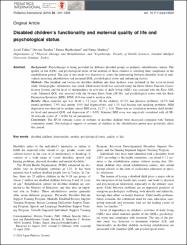| dc.contributor.author | Yıldız, Aysel | |
| dc.contributor.author | Tarakçı, Devrim | |
| dc.contributor.author | Hajebrahimi, Farzin | |
| dc.contributor.author | Mutluay, Fatma | |
| dc.date.accessioned | 10.07.201910:49:13 | |
| dc.date.accessioned | 2019-07-10T20:02:29Z | |
| dc.date.available | 10.07.201910:49:13 | |
| dc.date.available | 2019-07-10T20:02:29Z | |
| dc.date.issued | 2016 | en_US |
| dc.identifier.citation | Yıldız, A., Tarakçı, D., Hajebrahimi, F. ve Mutluay, F. (2016). Disabled children's functionality and maternal quality of life and psychological status. Pediatrics International, 58(12), 1291-1296. https://dx.doi.org/10.1111/ped.13020 | en_US |
| dc.identifier.issn | 1328-8067 | |
| dc.identifier.issn | 1442-200X | |
| dc.identifier.uri | https://dx.doi.org/10.1111/ped.13020 | |
| dc.identifier.uri | https://hdl.handle.net/20.500.12511/3658 | |
| dc.description | WOS: 000405299600006 | en_US |
| dc.description | PubMed ID: 27085099 | en_US |
| dc.description.abstract | Background: Physiotherapy is being provided for different disabled groups in pediatric rehabilitation centers. The quality of life (QOL) and psychological status of the mothers of these children is affecting their compliance in the rehabilitation period. The aim of this study was therefore to assess the relationship between disability level of individuals receiving rehabilitation and maternal QOL, psychological status and influencing factors. Methods: One hundred and twenty-six disabled children and their mothers were included in this cross-sectional study. Demographic information was noted. Child motor level was assessed using the Gross Motor Function Classification System and the level of independency in activities of daily living (ADL) was assessed with the Katz ADL scale. Maternal QOL was assessed with the 36-item Short Form (SF-36), and psychological status with the Beck Depression Inventory (BDI). SPSS 18.0 was used to analyze data. Results: Mean maternal age was 36.46 +/- 7.2 years. Of the children, 67.5% had physical problems, 16.7% had mental problems, 7.9% had autism, 4.8% had hyperactivity, and 3.2% had hearing and speaking problems. Mild depression was detected in mothers (mean BDI score, 11.27 +/- 8.1). There was no correlation between child disability level and maternal QOL and depression (P > 0.05). Maternal BDI score was negatively correlated with all SF-36 subscale scores (P < 0.001 for all parameters). Conclusion: The SF-36 subscale scores of mothers of disabled children were decreased compared with Turkish community norms. Psychological support of mothers of children in the rehabilitation period may positively affect this period. | en_US |
| dc.language.iso | eng | en_US |
| dc.publisher | Wiley | en_US |
| dc.rights | info:eu-repo/semantics/openAccess | en_US |
| dc.subject | Disabled Children | en_US |
| dc.subject | Functionality | en_US |
| dc.subject | Mother | en_US |
| dc.subject | Psychological Status | en_US |
| dc.subject | Quality of Life | en_US |
| dc.title | Disabled children's functionality and maternal quality of life and psychological status | en_US |
| dc.type | article | en_US |
| dc.relation.ispartof | Pediatrics International | en_US |
| dc.department | İstanbul Medipol Üniversitesi, Sağlık Bilimleri Fakültesi, Ergoterapi Bölümü | en_US |
| dc.authorid | 0000-0001-9804-368X | en_US |
| dc.authorid | 0000-0003-1432-0913 | en_US |
| dc.identifier.volume | 58 | en_US |
| dc.identifier.issue | 12 | en_US |
| dc.identifier.startpage | 1291 | en_US |
| dc.identifier.endpage | 1296 | en_US |
| dc.relation.publicationcategory | Makale - Uluslararası Hakemli Dergi - Kurum Öğretim Elemanı | en_US |
| dc.identifier.doi | 10.1111/ped.13020 | en_US |
| dc.identifier.wosquality | Q4 | en_US |
| dc.identifier.scopusquality | Q3 | en_US |


















